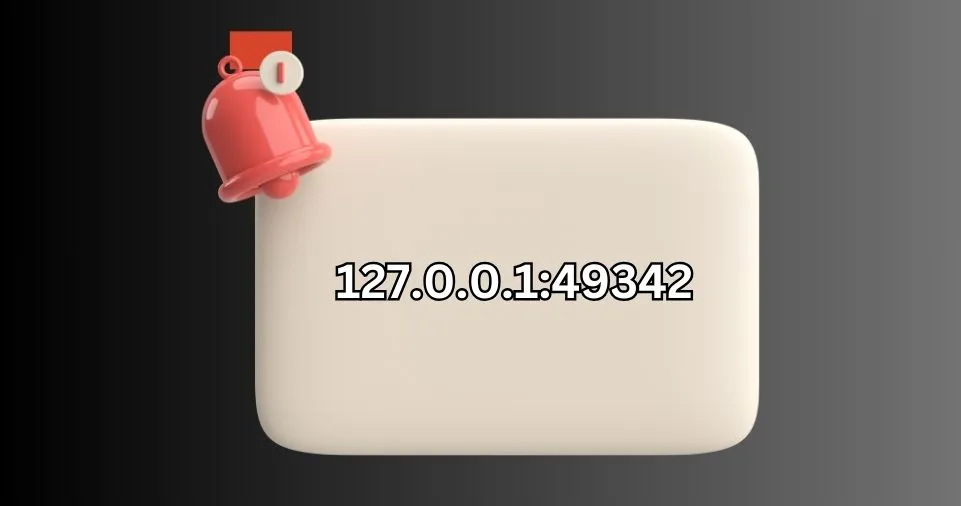The localhost IP address (127.0.0.1) and its associated ports, such as 49342 and 57573, are essential tools in web development and network testing.
These addresses enable internal communication on your device, allowing you to run applications, servers, and services locally without exposing them to the internet.
Whether you’re developing software, testing a web application, or troubleshooting network issues, understanding how localhost IP and ports function is crucial for creating secure, efficient, and isolated environments for testing and development.
What is 127.0.0.1?
The IP address 127.0.0.1 is widely known as the localhost address. In simpler terms, it’s your computer’s way of referring to itself.
When data is sent to 127.0.0.1, it doesn’t leave your machine but loops back internally.
This is why it’s also called a loopback address. Any device running on a network has this local IP, allowing internal communication without sending information over the internet.
For developers and network engineers, localhost is an invaluable tool. It enables them to run servers or test applications without affecting external users or systems.
The localhost IP address serves as a testing ground to ensure that everything functions correctly before deploying it into a live environment.
| Term | Definition |
|---|---|
| 127.0.0.1 | The localhost IP, used for internal communication on your device |
| Loopback | A process where the device routes data back to itself |
| Port 49342 | A temporary port used by applications for local communication |
What is the Significance of Ports Like 49342 and 57573?
When we refer to 127.0.0.1:49342 or 127.0.0.1:57573, we are pointing to an IP address (127.0.0.1) combined with a port number.
The port is an endpoint for communication and allows different services on your device to use the same IP address without conflict.
Every port has a number, and in the case of 49342 and 57573, these are known as ephemeral ports, typically ranging from 49152 to 65535.
Ephemeral ports are temporary and often used for client-side connections when communicating with a server.
For example, if you’re developing a web application, it might run locally on your machine at 127.0.0.1:49342. These ports are freed up after the communication session ends and can be reused by other services.
Example: Let’s say you’re developing a local website. You configure it to run on 127.0.0.1:49342. The 127.0.0.1 refers to your computer, and 49342 is the port through which the application will communicate internally. Once you’re done testing, this port is released, and another service can use it.
Why Does Localhost Matter in Web Development?

For developers, localhost is indispensable. It allows them to build, test, and refine applications in a controlled, risk-free environment.
Before deploying a website or software to live servers, developers use 127.0.0.1 to simulate how the application will perform.
Testing on localhost ensures that any bugs or errors are fixed before they affect real users.
Imagine you’re working on a new web application. You need to test how the site functions, but deploying it to a public server while it’s unfinished could expose it to security vulnerabilities or incomplete features.
By using localhost, you’re able to mimic a live environment without exposing it to the internet.
- Web Developers: Localhost helps developers test code changes and debug web applications.
- Network Engineers: Localhost allows for testing server configurations and network troubleshooting without affecting real users.
| Benefit | Explanation |
|---|---|
| Security | Localhost testing protects from exposing vulnerabilities to external threats |
| Control | Developers have full control over their environment, making it easier to debug |
| Isolation | Services on localhost are isolated, preventing interference from external apps |
How Localhost Enhances Security
One of the primary advantages of using localhost is its ability to provide a secure testing environment.
When developers run services on 127.0.0.1, they isolate those services from the external internet.
This means that any vulnerabilities or errors in the software do not pose a risk to external networks or devices.
By keeping the communication local, developers minimize the attack surface, ensuring that potential threats remain confined to their machine.
This level of isolation is particularly useful when testing sensitive applications, such as those involving personal data or financial transactions.
By running these tests on localhost, developers can ensure that their applications are secure before they are exposed to real-world threats.
Common Misconceptions About Localhost
There are a few common misunderstandings when it comes to using localhost:
- Accessible from the Internet: Many assume that 127.0.0.1 is accessible by others on the internet. This is incorrect. The localhost IP is strictly local to your machine, meaning that any connection to 127.0.0.1 only works internally.
- Ports Indicate Different Addresses: Some think that different ports (like 49342 or 57573) represent entirely different addresses. In reality, they are simply different channels through which multiple services communicate via the same IP address.
Troubleshooting Common Issues with Localhost and Ports
While localhost provides a secure and reliable environment for testing, issues can still arise, particularly when dealing with ports.
Here are some common problems associated with 127.0.0.1:49342 and 127.0.0.1:57573, along with troubleshooting tips:
Port Conflicts
One of the most frequent issues encountered when using localhost is a port conflict. This occurs when multiple applications attempt to use the same port simultaneously.
In such cases, the operating system cannot allocate the port to both services, leading to an error.
You can use the command netstat -ano on Windows or lsof -i on macOS/Linux to identify active ports and their associated processes.
Once identified, you can either stop the conflicting service or assign the application to a different port.
Firewall Restrictions
Though localhost traffic is usually not blocked by firewalls, there are instances where security software can interfere with specific port connections.
If you are unable to connect to 127.0.0.1:49342 or 127.0.0.1:57573, it’s worth checking your firewall settings to ensure that the required ports are open.
Adjusting your firewall or antivirus software to allow localhost traffic can resolve such connectivity issues.
Misconfigured Software
Sometimes, the issue lies within the configuration of the software itself.
For example, if your application fails to bind to 127.0.0.1:49342, check your software’s configuration. Ensure it’s set up to listen on the correct IP address and port.
Ensuring that the application is configured to use the correct IP address and port in its settings can often solve the problem.
System Resource Issues
If your computer is overloaded, the performance of localhost services may suffer.
Monitoring system resources like CPU and memory usage ensures that local applications run smoothly.
Fixing Port Issues: Step-by-Step Guide
| Problem | Solution |
|---|---|
| Port in Use | Use the command line to check active ports and reassign the conflicting port to a different one |
| Blocked by Firewall | Review and modify firewall settings to allow localhost traffic |
| Misconfigured Software | Update or check application configuration for proper port and IP settings |
| System Overload | Monitor and manage system resources to prevent performance issues |
Also Read: A True Relationship is Two Imperfect People Refusi – Tymoff
Real-World Applications of Localhost in IT and Development
Localhost is not only important in web development but also plays a crucial role across various IT and development fields.
Here are a few practical uses of localhost in real-world scenarios:
Game Development
In game development, localhost is often used for testing multiplayer functionalities.
Game developers simulate multiple clients connecting to a local server by using 127.0.0.1.
This enables them to debug multiplayer interactions and game mechanics before launching the game to the public.
API Development and Testing
API developers frequently use localhost to build and test their services.
For example, a developer might create an API endpoint on 127.0.0.1:49342 to test how their application interacts with the API in a secure environment.
Once all the bugs are fixed locally, the API can be deployed to a production server.
Network Simulations and Testing
Network engineers use localhost to simulate network environments, allowing them to troubleshoot configurations and test communication protocols.
By routing data through 127.0.0.1, engineers can test how systems will behave in a live network scenario without risking actual network traffic.
Conclusion
The localhost IP (127.0.0.1) and its associated ports, such as 49342 and 57573, are foundational to modern web development, network troubleshooting, and application testing.
By understanding how localhost works and why it’s critical, you can efficiently create and test applications in a secure, isolated environment.
Whether you’re developing a new website, testing network configurations, or troubleshooting port conflicts, the knowledge of how to leverage localhost will ensure smoother processes and faster troubleshooting.
Embrace localhost as a key tool in your digital toolkit—it’s not just a networking concept; it’s the gateway to efficient and secure application development.


